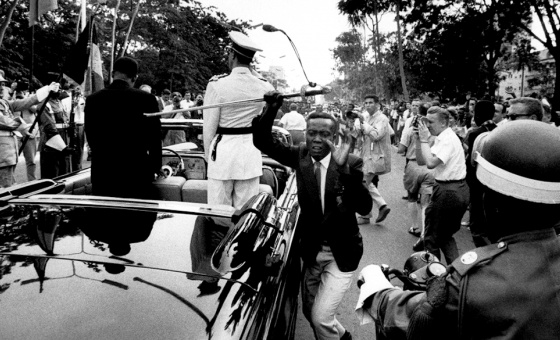This is the last article you can read this month
You can read more article this month
You can read more articles this month
Sorry your limit is up for this month
Reset on:
Please help support the Morning Star by subscribing here
EMMERSON MNANGAGWA was sworn in yesterday as Zimbabwe’s new president, 10 days after the military moved against long-time leader Robert Mugabe.
In a speech to thousands of supporters at a stadium in the capital Harare, Mr Mnangagwa pledged to reduce unemployment and improve the health of the country’s economy.
Only about 500,000 of Zimbabwe’s 13 million people have formal employment. Trying to rally young people in the summer, Mr Mugabe told jobless youths to “keep chickens [and] grow mushrooms.”
Mr Mnangagwa called for economic sanctions on Zimbabwe to be lifted and said that “all foreign investment will be safe in Zimbabwe.”
He also said that white farmers whose land had been seized would receive compensation. The proceeds from those takeovers, along with nationalisations including of the country’s diamond mines, appear to have largely gone to top officials.
It raises questions about the path Mr Mnangagwa intends to take.
Already the International Monetary Fund (IMF) has begun calling for immediate economic reforms, including cuts to government spending and repayment of foreign debt which Zimbabwe had defaulted on.
However, the South African Communist Party (SACP) has pointed to the imposition of the World Bank and IMF’s neoliberal economic policies as a main reason for the country’s poor economic state.
“The problems were fundamentally a result of many years of colonial domination by Britain and imperialist exploitation of the people of Zimbabwe and their basic national wealth,” SACP general secretary Blade Nzimande said on Thursday.
Mr Mnangagwa, a former defence minister, was close to Mr Mugabe for many years but was sacked as vice-president shortly before the military coup — reportedly to clear the way for Mr Mugabe’s wife Grace to take over.
It appeared to mark a shift in influence away from veterans of the country’s liberation war to a younger generation linked to Ms Mugabe.
While he pledged to “serve our country as the president of all citizens, regardless of colour, creed, religion, tribe or political affiliation,” Mr Mnangagwa was involved in the mid-1980s Gukurahundi massacres in which 20,000 Ndebele people were killed.








